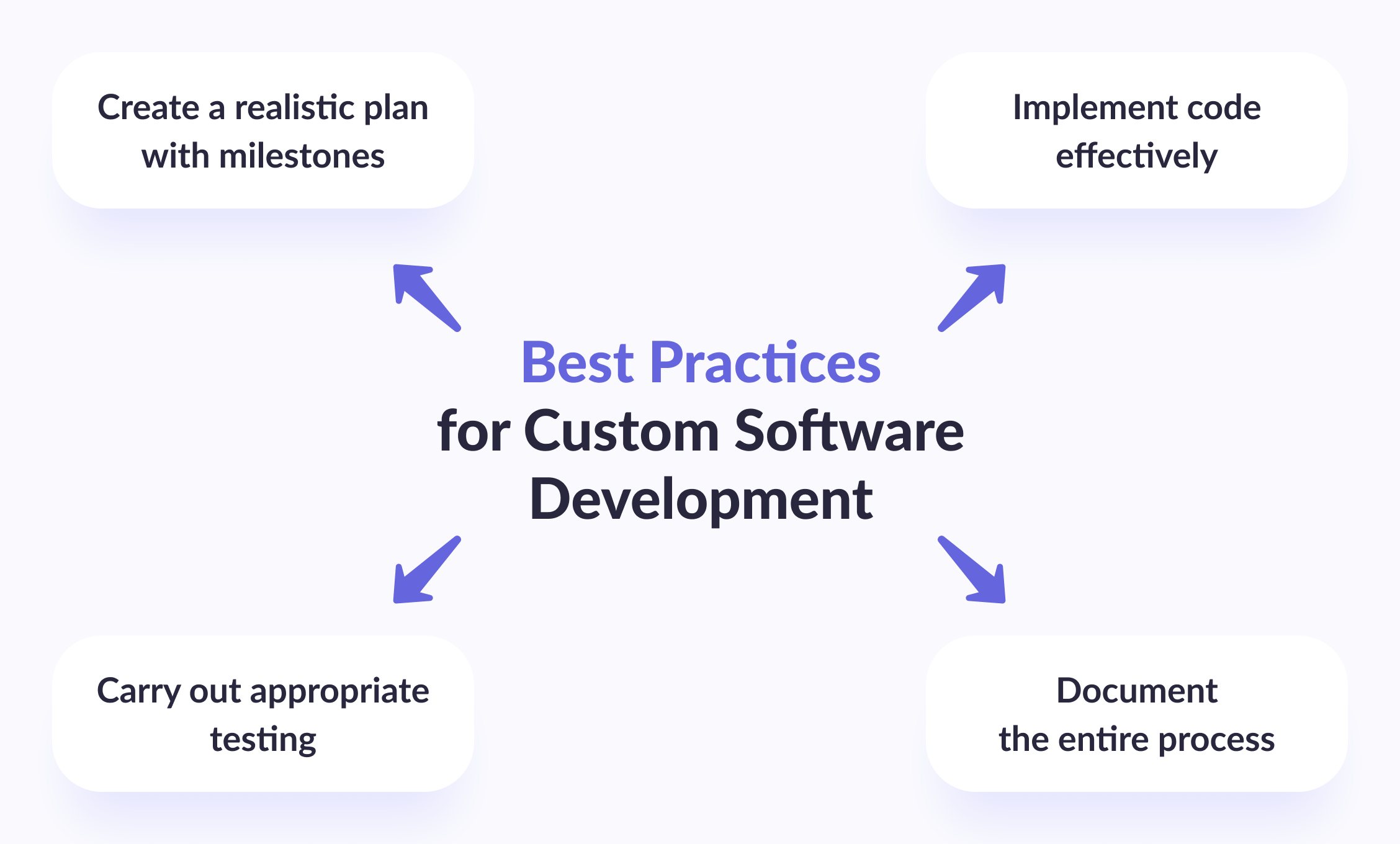Companies are always on the search for software that can help them improve and speed up their daily business operations. To do so, businesses most often invest in commercial off the shelf solutions. However, it can be difficult to locate a single software that meets all of their requirements. As a result, companies frequently invest in multiple products.
Consider investing in bespoke software development based on your specific business requirements if you require a one-of-a-kind product that meets all of your company's requirements.
In this article, we cover the basics and key benefits of custom software development and how it can help a company increase business output and reduce costs in the long run.
What Is Custom Software Development?
Custom software development is creating applications for specific business needs. An in-house development team or outsourcing partners will work with you to understand your unique needs in detail and then develop a program that will cater to them.
Building custom software can be pricier than buying ready-made solutions, but it tends to save time in the long run if it gives businesses an edge over their competitors. Custom software can also be adjusted to add features in the future when required.
Now that you understand the meaning of custom software development, let's explore its competitive advantages and how software development companies can streamline processes.
Top 6 Benefits of Custom Software Development
Not sure what custom software can do for your company? In this section, we'd love to explain the most common custom software advantages.

1. Personalized to the Specific Needs of the Company
Custom software developed from scratch based on what you need can be a beneficial solution for a company, as it is designed to match the unique needs of a business or an individual. In addition, custom software is built to scale and grow with the company, so it is possible to add or remove any features on request.
2. Custom Software Is Cost-Effective
One of the greatest advantages of custom built software development is that it is cost-effective. Although ready-made software may initially appear to be less expensive, there are typically additional costs associated with it that make it more costly in the long run.
When buying off-the-shelf software, businesses often have to pay for features they don't need, as those are a part of the software. However, investing in personalized software helps exclude unnecessary features. The company can build a list of functions they require and rely on one product instead of investing in multiple ones to get everything they need.
3. Fast Software Integration
Integrating multiple solutions to get the full picture of your work takes time and effort. Custom-built software is developed with consideration for a company's workflow, and integrations between different applications are quick. This is another great benefit of custom software.
Your business probably already uses multiple software solutions. However, you may have a hard time integrating those existing solutions with a new out-of-the-box product. When developed from scratch, tailor made software features seamless integration, allowing you to save costs and speed up its introduction.
Everything you need to know
Custom software development by industries. Complete guides by our top experts. Check out the most important topics about the most popular industries.
4. High Reliability and Security
Off-the-shelf software is made to meet the needs of companies from various industries. In terms of security, this means that the software’s source program code is publicly available, making it easier to hack the software.
Since tailored solutions are not publicly accessible, your company will enjoy security concerns decreasing:
A tailor-made solution includes a detailed analysis of the company's specific requirements and calculates hidden risks that may happen along the way for that specific company.
Customized software is always thoroughly tested based on a company’s unique requirements, granting high performance and reliability to deliver maximum value for your business.
5. Scalability and Flexibility
One of the most significant advantages of custom software development is that it can be adapted and changed as your business grows. Many companies tend to outgrow their off-the-shelf software, and they lack flexibility as their features are pre-determined by the development company. Scalability is another huge problem for off-the-shelf software, so it's more rational to rely on custom-made apps with suitable architecture and infrastructure from skilled DevOps engineers.
Unique solutions allow you to choose from a variety of features and functions, only adding the ones required for your company's particular needs. Whenever you need new features or support for the growing demands of your company, a tailored solution will undoubtedly accommodate all your requests.
6. Continuous Support and Maintenance
Companies that develop off-the-shelf software most often include customer support. However, they also tend to discontinue support or updates for some of their products. Also, it is not uncommon for software companies to have bad customer support.
Since custom applications are tailored to a company's specific needs, companies can ask for support whenever something goes wrong. Customized solutions are built knowing what problems are common in your industry, allowing for better troubleshooting and faster issue resolution.
To better understand the differences between custom and off-the-shelf software, we prepared a more detailed comparison between the two.
After discovering the main advantages of custom made software it’s time to better understand the differences between custom and off-the-shelf software.
Disadvantages of Custom Software Development
High Initial Cost. Custom software development typically requires a significant upfront investment due to the cost of planning, design, and development. This can be a barrier for small businesses or startups with limited budgets.
Time-Consuming. Building custom software takes time because it involves multiple phases like analysis, design, development, and testing. Unlike off-the-shelf solutions, which are ready to use, custom development may lead to delays in implementation.
Risk of poor quality. Custom software development demands thorough and clear requirements from the start, which can be challenging to define without expert knowledge. Misunderstanding or incomplete requirements may lead to expensive rework or project delays.
Risk of information leakage. Confidentiality conditions are spelled out in the contract and officially secured. And yet, it is almost impossible to prove the contractor's involvement in the disclosure of the customer's internal information.
Dependence on external contractors. Entrusting the performance of certain functions to a partner means violating the corporate unity of the company. The enterprise incurs losses if the contractor does not deliver the desired result.
Lack of control over the process management. Since the tasks are solved by outsourced team personnel, it is quite difficult to completely transparently monitor the stages of their implementation.
Risk of bankruptcy of the contractor. An agency can go bankrupt, like any software development company. This will result in the failure to perform delegated functions and a temporary decrease in the efficiency of the customer enterprise.
Custom Software vs. Off-the-Shelf Software Comparison
In this section, we explore the greatest differences between custom and pre-made customized software.

In some cases, the price might be a deciding factor when choosing custom software or ready-made one. But how expensive can customized software be?
Why should a business utilize custom software development?
Custom development allows you to achieve the optimal level of digitalization and automate most of the business processes. It helps a business to create and integrate an application or program of any complexity and scale, given the appropriate resources. What competitive edge can bring custom-developed software solutions to business?
1. Strict Compliance with business goals
Unlike boxed solutions, whose functionality often only partially matches the needs of your business, custom software engineering allows you to create the enterprise software that you need. No third-party functions, long downloads, and remote databases - nothing more. Instead, the enterprise gets only the features it needs and the level of scalability that fits its business model. Over time, the staff will find it easier to work with a custom solution, and it will bring the business much more results than any available off-the-shelf software.
2. Harmonious development
Custom software grows with the business. Unlike boxed solutions, whose updates the user does not control in any way, the clients who have custom software can change and develop it in accordance with their vision and the current needs of the enterprise. As a rule, IT companies assist customers not only with integration issues but also with further product improvement. For example, Geniusee is always in touch with clients and provides them with extensive post-integration support. It includes updating software, fixing bugs, introducing new features, and changing existing ones.
3. Control and ownership
Custom software is the property of the customer, and even the developer does not have the right to dispose of it without permission. The uniqueness of the personalized solution not only increases competitiveness but also increases the level of cybersecurity within the company. Any errors or bugs identified by the customer must be immediately corrected by the software development team. Unlike boxed solutions, where you can wait months for the necessary updates. The completeness of control also makes it easy to integrate and combine custom software solutions with others, such as applications, CRM or ERP systems.


Thank you for Subscription!
4. Long-term savings
Custom solutions may seem expensive compared to boxed software, but often this only reflects the short term. As a rule, the long-term use of "boxes" is associated with a number of additional costs: from paid updates to the need to overpay for new accounts when expanding the business. In addition, there is always a risk that the off-the-shelf application will cease to be relevant at all. Then your company will have to switch to a completely new solution, overpay again, and also incur losses associated with retraining teams. Here, custom software will always be more reliable. Created specifically for your business, it will not lose relevance and will be updated in accordance with the changing range of tasks. You pay only once - for the development of the initial product without additional risks and unexpected expenses in the future.
5. Direct interaction with IT specialists
A boxed software developer is a faceless vendor who doesn't know your business and has no interest in benefiting you specifically. In addition to your company, hundreds of others will use their “box”. This not only reduces the flexibility of the solution but harms its reliability, as well as trust between the client and the supplier.
On the contrary, IT companies that provide custom app development interact directly with the business. And this is a really important competitive edge.
For example, the Geniusee outsourcing vendor does not just create a product for sale but put its reputation on the line. The success of our customers defines our success. Our further development depends on your satisfaction. Therefore, we are directly interested in providing the most effective custom tailored solutions for business.
How much does it cost to build custom software?
Multiple factors affect the cost of creating custom software, so it can be challenging to provide an accurate estimate. According to Intersog, the cost of custom software can varie between $50,000 and $250,000.
Here are several factors that significantly affect the price of developing custom software:
- Project complexity. The more unique and complicated features the software has, the higher the cost.
- Software size. The size of the software solutions depends on the number of pages and screens. The more pages and screens you want, the more work has to be done, increasing the price.
- Team size, expertise, and location. To develop high-quality software, it is necessary to hire a dedicated team of experts. Software developers from North America and Western Europe tend to charge the highest license fees, whereas developers from Asia and Eastern Europe tend to do a great job for a smaller price.
- Delivery timeline. Complex software requires much time for development. The longer it takes to develop software, the higher the cost of the project.
- Now that you’re more familiar with the costs and requirements of custom software development, it’s time to focus on some of the best practices that will help you get started in no time!
Quick health check
Is your business analysis good enough? Are you sure? Check out how your company is doing
Best Practices for Custom Software Development
Developing custom software is a project that requires time and dedication. Here are the best practices to ensure that everything goes smoothly:
- Create a realistic plan with milestones. Team up with experts who can create a realistic roadmap for your project and make sure to keep the project on track.
- Implement code effectively. Hire experienced developers who can ensure that the code is implemented effectively and smoothly.
- Carry out appropriate testing. Test the basic elements during the development of the software. Once the software is complete, beta users should carry out user testing.
Document the entire process. Document every step of the development process in case some issues arise.

Keeping all this in mind, you may ask if there are ready solutions that can help you develop your own software.
Build Your Custom Software with Geniusee
Geniusee is your go-to team to ensure your custom software runs smoothly.
Geniusee is a software and product development company focused on the wins of its clients. Founded in 2017 in Kyiv, Ukraine, it cumulates the expertise of 150+ skilled professionals who have already completed notable projects in multiple industries.
Teaming up with Geniusee means working with a results-oriented team equipped with a versatile tech stack.
Our quality is proven by numbers! The Geniusee team has completed more than 100 custom software development projects on time and within budget in different domains, including finance, retail, automotive, real estate, transportation, education, and tourism. Geniusee has been working with companies located in different countries, including the USA, the UK, Germany, Switzerland, Japan, Singapore, and Ukraine. Contact us to check our expertise personally.
Conclusion
Custom software development is the creation of software for a client's unique business needs. There are a number of advantages of custom software, including products that can be completely customized, high levels of security, dependability, scalability, and adaptability. Investing in bespoke solutions will undoubtedly pay off in the long run, despite the fact that the cost may initially appear to be higher when compared to products that are already on the market.





















